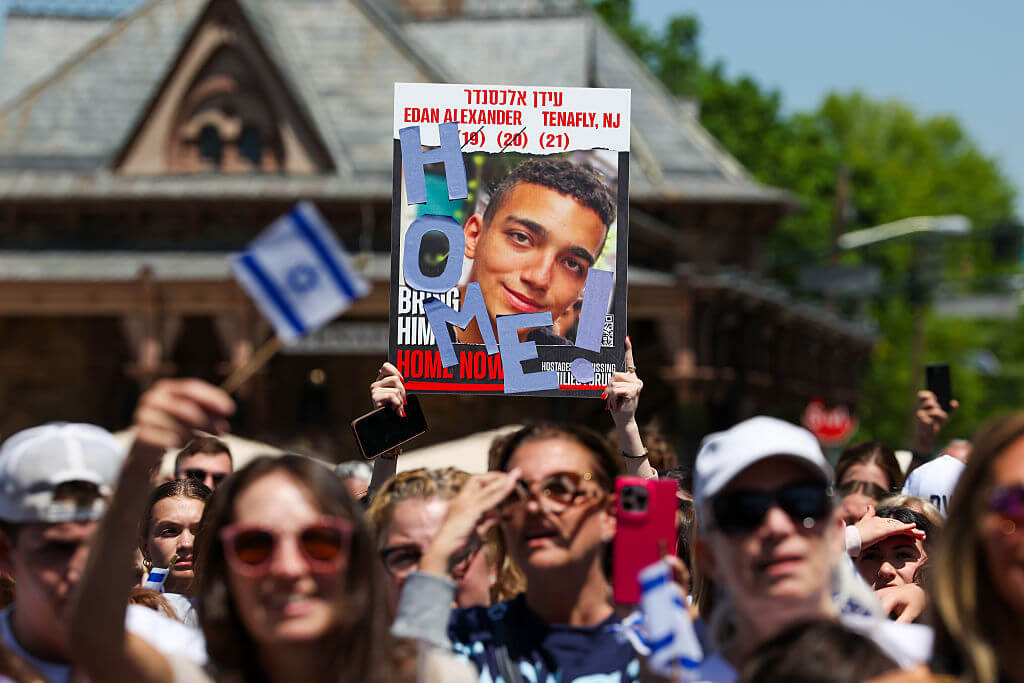Contentious Hebron Jewish Settlement Gets First Green Light To Expand in Decade

Image by Getty Images
The Israeli government has approved the planning of new housing for Jews in the predominantly Arab West Bank city of Hebron.
COGAT, the Israel Defense Forces Coordinator of Government Activities in the Territories Unit, which coordinates civilian issues in the West Bank, confirmed to The Associated Press on Monday that permission was granted for planning infrastructure in the area.
According to the plan, the residential area will be in the military compound of Plugat Hamitkanim, formerly the city’s central bus station. Israel requisitioned the land for military use in the 1980s, according to Peace Now.
In a letter to Israeli Defense Minister Avigdor Liberman and to the head of the Civil Administration, Peace Now called for a halt to the residential planning for Jewish Israelis.
“What is happening in Hebron is a clear bending of the law, according to which a land seized for military purposes cannot be used for the purpose of settlement,” the group wrote. “The Israeli government continues to find new ways to accommodate the extreme settlers in the city of Hebron, where the occupation is the most apparent and most severe.
“If the military necessity is no longer there, the land must be returned to its owners and the protected lease agreement with the Hebron municipality must be renewed.”
Jewish residents of Hebron say the land is private property that belonged to Jews before the establishment of the state in 1948, according to Haaretz.
In 1968, Jews moved to Kiryat Arba, on the outskirts of Hebron, following a failed attempt to settle in Hebron itself. Jews began living in Hebron in 1979.
Peace Now’s Hagit Ofran told The Associated Press that the planning approval is the first in more than a decade.
The Forward is free to read, but it isn’t free to produce

I hope you appreciated this article. Before you go, I’d like to ask you to please support the Forward.
Now more than ever, American Jews need independent news they can trust, with reporting driven by truth, not ideology. We serve you, not any ideological agenda.
At a time when other newsrooms are closing or cutting back, the Forward has removed its paywall and invested additional resources to report on the ground from Israel and around the U.S. on the impact of the war, rising antisemitism and polarized discourse.
This is a great time to support independent Jewish journalism you rely on. Make a gift today!
— Rachel Fishman Feddersen, Publisher and CEO
Support our mission to tell the Jewish story fully and fairly.
Most Popular
- 1

Fast Forward Ye debuts ‘Heil Hitler’ music video that includes a sample of a Hitler speech
- 2

Opinion It looks like Israel totally underestimated Trump
- 3

Culture Is Pope Leo Jewish? Ask his distant cousins — like me
- 4

Fast Forward Student suspended for ‘F— the Jews’ video defends himself on antisemitic podcast
In Case You Missed It
-

News In Edan Alexander’s hometown in New Jersey, months of fear and anguish give way to joy and relief
-

Fast Forward What’s next for suspended student who posted ‘F— the Jews’ video? An alt-right media tour
-

Opinion Despite Netanyahu, Edan Alexander is finally free
-

Opinion A judge just released another pro-Palestinian activist. Here’s why that’s good for the Jews
-
Shop the Forward Store
100% of profits support our journalism
Republish This Story
Please read before republishing
We’re happy to make this story available to republish for free, unless it originated with JTA, Haaretz or another publication (as indicated on the article) and as long as you follow our guidelines.
You must comply with the following:
- Credit the Forward
- Retain our pixel
- Preserve our canonical link in Google search
- Add a noindex tag in Google search
See our full guidelines for more information, and this guide for detail about canonical URLs.
To republish, copy the HTML by clicking on the yellow button to the right; it includes our tracking pixel, all paragraph styles and hyperlinks, the author byline and credit to the Forward. It does not include images; to avoid copyright violations, you must add them manually, following our guidelines. Please email us at [email protected], subject line “republish,” with any questions or to let us know what stories you’re picking up.














